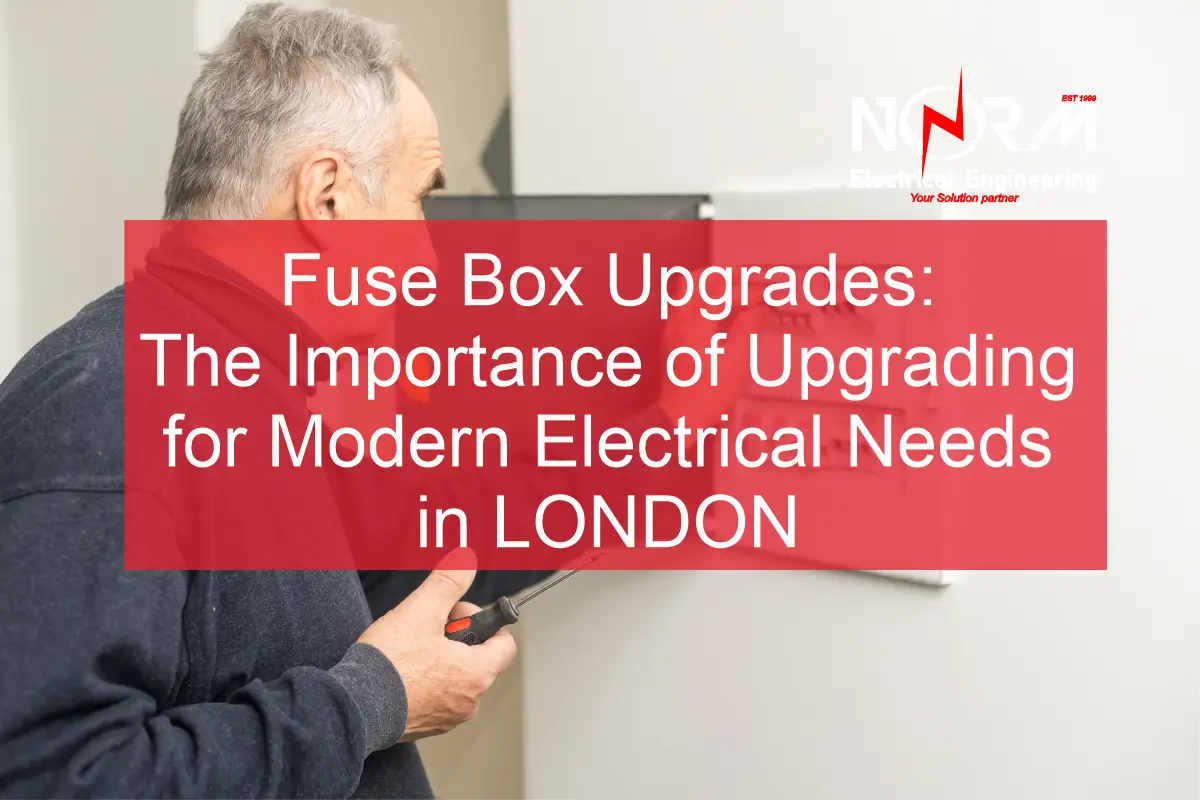Fuse Box Upgrades: The Importance of Upgrading for Modern Electrical Needs in London
In the fast-paced, ever-evolving city of London, the need for an efficient and safe electrical system in your home cannot be overstated. The fuse box (or consumer unit) is the heart of any electrical system, controlling the flow of electricity to various circuits and providing essential protection against electrical faults. While modern homes are often designed with advanced electrical systems, many properties in London still rely on outdated fuse boxes that may not meet the demands of contemporary electrical needs.
Fuse box upgrades are more than just a precaution; they are a necessity for homeowners in London looking to ensure that their homes remain safe, energy-efficient, and compliant with the latest regulations. Whether you live in a historic townhouse in central London or a newly built flat, understanding the importance of fuse box upgrades can help you make informed decisions that benefit both the safety of your home and your long-term energy savings.
This comprehensive guide will dive deep into the reasons why fuse box upgrades are essential for modern electrical needs in London, explaining the benefits, the process, and the factors that can influence the cost. We’ll also discuss why it’s vital to hire a professional electrician, explore common signs that indicate you need an upgrade, and highlight legal requirements in the UK. Additionally, we’ll explain how Norm Electrical Engineering can assist with your fuse box upgrade and provide a safer, more energy-efficient electrical system for your London home.
Table of Contents
What is a Fuse Box and Why is it Important?
The Importance of Fuse Box Upgrades for Modern Electrical Needs
2.1 Meeting Increased Power Demands
2.2 Enhancing Safety with RCDs and Circuit Breakers
2.3 Energy Efficiency and Lower Bills
2.4 Compliance with Current Building Regulations
When Do You Need a Fuse Box Upgrade?
Signs You Need a Fuse Box Upgrade
4.1 Frequent Tripped Fuses and Circuit Breakers
4.2 The Fuse Box is Over 20 Years Old
4.3 Incompatible with Modern Appliances and Electrical Systems
4.4 Lack of Residual Current Devices (RCDs)
The Fuse Box Upgrade Process: What You Need to Know
Cost of Fuse Box Upgrades in London
6.1 Factors Affecting the Cost
6.2 Typical Costs and Budgeting for the Upgrade
Why Hiring a Professional Electrician is Essential
Legal Requirements for Fuse Box Upgrades in the UK
How Norm Electrical Engineering Can Help You
Conclusion: The Long-Term Benefits of Fuse Box Upgrades
1. What is a Fuse Box and Why is it Important?
A fuse box, also known as a consumer unit, is an integral part of a home’s electrical system. It distributes electricity to various circuits throughout the house, ensuring that each section of your home, from lighting to power outlets, is safely powered. The fuse box also serves as a safety device, protecting your home from electrical faults by automatically cutting off the electricity supply when a problem arises.
The fuse box houses critical components such as fuses, circuit breakers, and Residual Current Devices (RCDs) that are designed to interrupt the electrical flow in the event of an overload or short circuit. This helps prevent electrical fires, electrocution, and damage to appliances. As electrical needs grow with technological advances, upgrading your fuse box is crucial to meet modern requirements for safety and efficiency.
2. The Importance of Fuse Box Upgrades for Modern Electrical Needs
As homes become increasingly dependent on electrical devices and appliances, the demands on your home’s electrical system grow. From high-powered kitchen appliances and air conditioning units to smart home technology and electric vehicles, your fuse box must be able to support all these devices while ensuring safety and efficiency.
2.1 Meeting Increased Power Demands
Modern homes in London require more electrical power than ever before. From smart home devices and entertainment systems to energy-intensive appliances such as ovens and washing machines, your home’s electrical circuits need to be equipped to handle these higher loads. Older fuse boxes may not be designed to accommodate the increased demand for power, resulting in overloading and potential safety hazards.
Upgrading your fuse box allows your electrical system to distribute electricity efficiently to all parts of your home, ensuring that it can handle the increased load. Newer units can be designed to support high-demand devices and multiple appliances simultaneously without overloading the circuits.
Helpful Resource: Energy Efficiency in the Home
2.2 Enhancing Safety with RCDs and Circuit Breakers
Fuse boxes from decades ago often lack important safety features such as Residual Current Devices (RCDs) and circuit breakers. RCDs provide an essential safety mechanism that cuts off the power supply when a fault is detected, such as in the case of an electrical shock or an earth leakage. This is crucial for protecting both the inhabitants of the home and the electrical system.
Upgrading to a modern consumer unit allows the installation of RCDs and circuit breakers, which significantly enhance the safety of your home. With these devices in place, the risk of electrocution and electrical fires is drastically reduced, providing you with peace of mind and ensuring that your home meets the latest safety standards.
Helpful Resource: Electrical Safety in the Home
2.3 Energy Efficiency and Lower Bills
An upgraded fuse box can also improve your home’s energy efficiency. Modern units provide better circuit protection, which helps reduce energy waste and prevent unnecessary electricity consumption. Additionally, new fuse boxes can be equipped with features such as energy-efficient smart meters that allow you to monitor and manage your energy usage more effectively.
By upgrading your fuse box, you can ensure that your home’s electrical system operates at its best, which may result in lower electricity bills over time. With more efficient energy distribution, the risk of overloading and unnecessary consumption is minimized.
Helpful Resource: Reducing Energy Bills and Saving Power
2.4 Compliance with Current Building Regulations
In the UK, electrical installations, including fuse boxes, must comply with stringent safety regulations to ensure that homes are safe and up to code. As part of the Building Regulations and the 18th Edition of the IET Wiring Regulations (BS 7671), homeowners are required to have an updated fuse box to meet current standards.
By upgrading your fuse box, you ensure that your electrical system is compliant with these legal requirements, helping you avoid potential fines and safety risks. Compliance also ensures that your electrical system is both safe and legally sound, providing you with the security of knowing that your home is protected.
Helpful Resource: Building Regulations – Part P: Electrical Safety
3. When Do You Need a Fuse Box Upgrade?
Knowing when to upgrade your fuse box is critical for ensuring that your home remains safe, efficient, and compliant with the latest standards. There are several key indicators that suggest it might be time to upgrade your fuse box:
Old Fuse Box: If your fuse box is over 20 years old, it may no longer meet modern safety standards or electrical demands.
Frequent Power Disruptions: If you frequently experience tripped circuit breakers or blown fuses, it may be a sign that your fuse box is overloaded or outdated.
Planning to Install New Appliances: If you’re upgrading to energy-intensive devices such as air conditioners, electric vehicle chargers, or large home appliances, your fuse box may need an upgrade to handle the additional load.
4. Signs You Need a Fuse Box Upgrade
Understanding the signs that indicate you need a fuse box upgrade can help prevent costly repairs and safety hazards. Here are some common signs to watch out for:
4.1 Frequent Tripped Fuses and Circuit Breakers
If you experience frequent tripped circuit breakers or blown fuses, this may indicate that your current fuse box cannot handle the electrical load required by your appliances. Over time, this can cause inconvenience and potential damage to the wiring and electrical components in your home.
4.2 The Fuse Box is Over 20 Years Old
Older fuse boxes were often designed to accommodate fewer circuits and appliances. If your fuse box is more than 20 years old, it’s likely not equipped to meet modern electrical needs, which can result in inefficiency and safety risks.
4.3 Incompatible with Modern Appliances and Electrical Systems
With the rise of energy-efficient appliances, smart home systems, and electric vehicles, older fuse boxes may struggle to provide adequate power. If your current fuse box is incompatible with newer systems, upgrading to a modern unit will ensure that your home can support all your electrical needs.
4.4 Lack of Residual Current Devices (RCDs)
Modern fuse boxes are equipped with RCDs, which are essential for protecting against electrocution and electrical faults. If your fuse box doesn’t have RCD protection, it’s highly recommended to upgrade to a unit that includes these safety features.
5. The Fuse Box Upgrade Process: What You Need to Know
Upgrading your fuse box is a relatively straightforward process, but it should always be carried out by a certified, professional electrician. The process typically involves:
Inspection: The electrician will inspect your current fuse box and electrical system to determine what needs upgrading.
Planning: A new fuse box system will be designed to meet the electrical demands of your home, taking into account any new appliances or technologies.
Installation: The old fuse box will be replaced with the new unit, and circuits will be rewired if necessary.
Testing and Certification: The electrician will test the new system and issue a certification to confirm that the upgrade meets all required safety standards and regulations.
6. Cost of Fuse Box Upgrades in London
The cost of upgrading your fuse box in London varies depending on the complexity of the work, the size of your home, and the materials required. On average, homeowners can expect to pay between £350 and £1,200 for a full fuse box upgrade, including installation and testing.
Factors that can affect the cost:
The size and layout of your home
The type of fuse box being installed
The need for rewiring or additional circuits
The electrician’s rates
7. Why Hiring a Professional Electrician is Essential
Fuse box upgrades should always be performed by a qualified, professional electrician. Hiring a professional ensures that the work is carried out safely, meets all legal and safety standards, and guarantees that the new system will function properly.
8. Legal Requirements for Fuse Box Upgrades in the UK
In the UK, electrical work, including fuse box upgrades, must comply with Part P of the Building Regulations and the 18th Edition of the IET Wiring Regulations. Non-compliance can result in penalties and, in some cases, insurance issues.
Helpful Resource: Electrical Safety Standards in the Private Rented Sector
9. How Norm Electrical Engineering Can Help You
At Norm Electrical Engineering, we specialize in fuse box upgrades throughout London. Our team of certified electricians can assess your current electrical system, recommend the best upgrade options, and ensure that your home meets modern electrical needs safely and efficiently.
For more information or to request a quote, visit Norm Electrical Engineering or call us at 020 8245 8400 or 0772 430 8998.
10. Conclusion: The Long-Term Benefits of Fuse Box Upgrades
Fuse box upgrades are an essential investment for homeowners in London. Whether you’re improving safety, reducing energy bills, or ensuring compliance with the latest regulations, upgrading your fuse box offers a wide range of benefits. If you’re unsure whether it’s time to upgrade, consider the signs, and reach out to a professional electrician to assess your home’s needs.
For expert advice and fuse box upgrade services in London, Norm Electrical Engineering is here to help. Ensure your home is safe, efficient, and future-ready by upgrading your fuse box today









